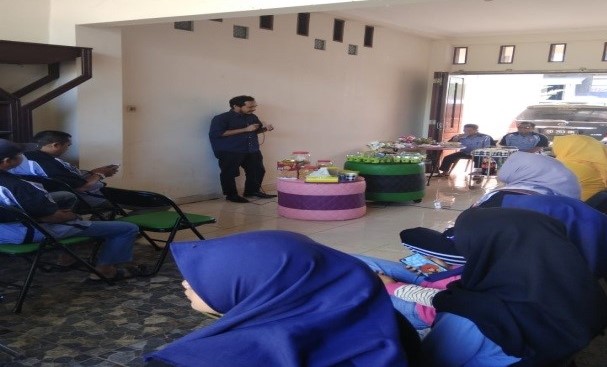Pemberdayaan Usaha Ekonomi Produktif bagi Masyarakat di Kelurahan Allepolea, Kecamatan Lau Kabupaten Maros
##plugins.themes.academic_pro.article.main##
Abstract
Kegiatan ini bertujuan untuk memberikan penyuluhan dan pelatihan tentang kewirausahaan dan pengolahan luaran yang menghasilkan produk bernilai ekonomis yaitu sabun dan deterjen, serta mengetahui metode pemasarannya. Sasaran peserta dari kegiatan ini adalah warga kelurahan Allepolea Kecamatan Lau di Kabupaten Maros. Secara umum, peserta sangat antusias mengikuti pelatihan yang ditunjukkan dari ketekunan dan kedisiplinan dalam mengikuti setiap tahapan dalam kegiatan. Selain itu setiap peserta ikut berpartisipasi dalam menentukan materi pelatihan terkait dengan pelaksanaan tugas yang dijalankan sehari-hari. Setiap peserta mampu menghasilkan produk bernilai ekonomis dan juga mampu memasarkan produk tersebut baik melalui mekanisme penjualan offline maupun online. Melalui kegiatan ini setiap peserta merasakan manfaat dari kegiatan pemberdayaan usaha ekonomi produktif melalui kegiatan dan mengharapkan kegiatan seperti ini dapat diberikan secara rutin dan juga membawa khazanah baru bagi pengetahuan dan keterampilan mereka sehingga akan meningkatkan taraf kehidupan warga secara ekonomi.
##plugins.themes.academic_pro.article.details##

This work is licensed under a Creative Commons Attribution-NonCommercial 4.0 International License.
JURPIKAT (Jurnal Pengabdian Kepada Masyarakat) accepts manuscripts that have not been published elsewhere and are not under consideration for publication by other print or electronic media. Authors retain copyright and grant the journal right of first publication with the work simultaneously licensed under a Creative Commons BY-NC License that allows others to share the work with an acknowledgment of the work's authorship and initial publication in this journal.
Authors are able to enter into separate, additional contractual arrangements for the non-exclusive distribution of the journal's published version of the work (eg, post it to an institutional repository, in a journal or publish it in a book), with an acknowledgment of its initial publication in this journal.
License to Publish
The non-commercial use of the article will be governed by the Attribution-NonCommercial 4.0 International (CC BY-NC 4.0). The author hereby grants JURPIKAT (Jurnal Pengabdian Kepada Masyarakat) an exclusive publishing and distribution license in the manuscript include tables, illustrations or other material submitted for publication as part of the manuscript (the “Articleâ€) in print, electronic and all other media (whether now known or later developed), in any form, in all languages, throughout the world, for the full term of copyright, and the right to license others to do the same, effective when the article is accepted for publication. This license includes the right to enforce the rights granted hereunder against third parties.
References
Blumberg, R. L. (2005, August). Women’s economic empowerment as the “magic potion†of development. In 100th Annual Meeting of the American Sociological Association, August, Philadelphia.
Buvinić, M., & Furst-Nichols, R. (2016). Promoting women's economic empowerment: what works?. The World Bank Research Observer, 31(1), 59-101.
Febriyantoro, M. T., & Arisandi, D. (2018). Pemanfaatan digital marketing bagi usaha mikro, kecil dan menengah pada era masyarakat ekonomi ASEAN. Jurnal Riset Manajemen dan Bisnis Dewantara (JMD), 1(2), 61-76.
Gibbs, A., Corboz, J., Chirwa, E., Mann, C., Karim, F., Shafiq, M., Mecagni, A., Maxwell-Jones, & Jewkes, R. (2020). The impacts of combined social and economic empowerment training on intimate partner violence, depression, gender norms and livelihoods among women: an individually randomised controlled trial and qualitative study in Afghanistan. BMJ global health, 5(3), e001946.
Haeruddin, M. I. M., Musa, M. I., & Musa, C. I. (2017). Pelatihan Keterampilan Penggunaan Media Mailing List Sebagai Media Belajar Bagi Siswa-Siswa di SMK Sari Buana Makassar. JATI EMAS (Jurnal Aplikasi Teknik dan Pengabdian Masyarakat), 1(2), 16-20.
Jorge, S. N. (2002, November). The economics of ICT: challenges and practical strategies of ICT use for women’s economic empowerment. In UN Meeting on ICTs and their Impact on and Use as an Instrument for the Advancement and Empowerment of Women, Seoul, Korea (pp. 11-14).
Kabeer, N. (2012). Women’s economic empowerment and inclusive growth: labour markets and enterprise development. International Development Research Centre, 44(10), 1-70.
Lahafi, F., Muchsin, A., Semaun, S., & Rahim, Z. A. (2019). Development of Creative Industries Training Towards Sharia Economic Empowerment in Bilalangnge Community, Parepare City, South Sulawesi. Malaysian E Commerce Journal (MECJ), 3(2), 33-35.
Mengstie, B., & Singh, A. (2020). Ethiopian Women Economic Empowerment Through Microfinance. Indian Journal of Finance and Banking, 4(2), 51-57.
Miles, M. B., & Huberman, A. M. (1994). Qualitative data analysis: An expanded sourcebook. Sage
Sadji, Partoatmodjo. (2004). Masalah Kemiskinan dan Kompleksitas Penanggulangannya. Jakarta. Kementerian Koordinator bidang Kesejahteraan.
Saksono, H. (2012). Ekonomi Kreatif: Talenta Baru Pemicu Daya Saing Daerah. Jurnal Bina Praja: Journal of Home Affairs Governance, 4(2), 93-104.
Septiyana, L., Nizaruddin, N., Rahmawati, N. I., Atma, S. R., Putri, A. S., & Astuti, N. (2020). Pemberdayaan Ekonomi Kreatif Masyarakat Melalui Pengolahan Makanan Tradisional Kerupuk Dapros Di Desa Gunung Rejo. DEDIKASI: Jurnal Pengabdian Masyarakat, 2(1), 105-117.
Sugiyono. (2006). Metode Penelitian Pendidikan. Bandung : Alfabeta.
Utari, A. R. T., & Riani, A. (2015). Analisis Kelayakan Usaha Ternak Sapi Potong pada Berbagai Skala Kepemilikan di Desa Samangki Kecamatan Simbang Kabupaten Maros [Skripsi]. Fakultas Peternakan. Universitas Hasanuddin.

